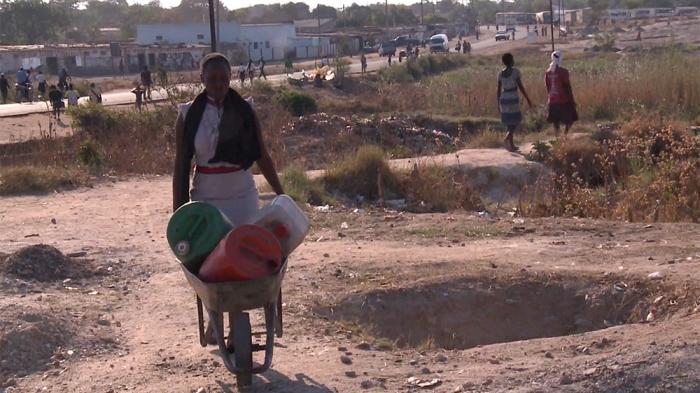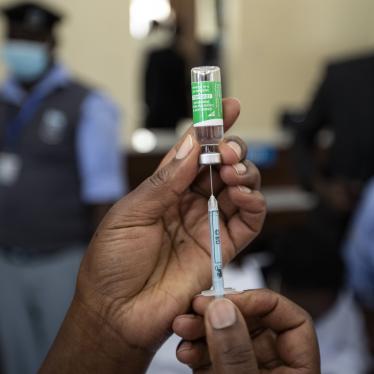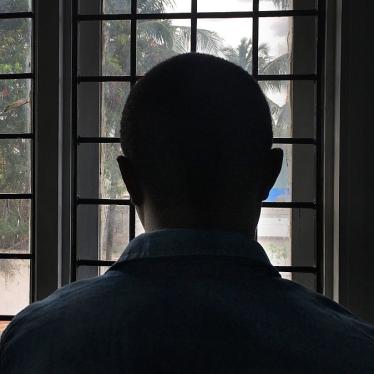Read a text description of this video
Dewa Mavhinga, HUMAN RIGHTS WATCH
The streets of Harare, almost desolate. Like many countries across the world, Zimbabwe ordered a nationwide lockdown in an attempt to slow the spread of Covid-19. But even before the virus arrived here, major parts of the country lacked one of the essential elements to protect people’s health and prevent infectious disease outbreaks.
Melody Diza, Resident of Harare
The problem started in 2013. Water stopped running in our taps. We have to walk long distances, five to six kilometers just to get water.
Dewa Mavhinga, HUMAN RIGHTS WATCH
We were here in Harare shortly before the Covid-19 pandemic to continue an investigation on a severe sanitation and water crisis.
Dewa Mavhinga, on camera
Thousands of residents across Harare have no access to clean water.
Herbert Gomba, Mayor of Harare
We are losing a lot of treated water along the system because the pipeline is aged. Around a third of our people only are accessing water, two thirds are not, and that’s a dangerous situation.
DEWA on camera
Many residents spend up to 10 hours a day and sometimes queue throughout the night to get water from boreholes that are contaminated and unsafe and also from wells in their backyards.
Herbert Gomba, Mayor of Harare
We have had three outbreaks of cholera and certainly if we don’t act to improve our infrastructure, we are bound to be susceptible to numerous waterborne diseases. We are urging residents not to drink from unprotected, unsafe wells.
Maria Phirim, Resident of Harare
Yes, sometimes there is a breakout of diseases. We just use it [water] as it comes. We don’t put any chemicals in it. We can’t afford the chemicals. We don’t have chemicals. We just use the water as it comes.
Dewa Mavhinga, HUMAN RIGHTS WATCH
Women and children of school-going age spend sometimes eight, nine hours and all night at the borehole queuing for water.
Bridget Madziro
Sometimes we don’t have enough time to study because we have to stay in the water queue even at night as late as 10 p.m. Other times we have to wake up as early as 4 a.m. to join the queue.
Dewa Mavhinga, HUMAN RIGHTS WATCH
This problem has gone on long enough, but Covid-19 has made an already dire situation even more urgent. Combating the spread of the virus requires people to wash their hands regularly and maintain good physical hygiene. For that, they need to have access to an uninterrupted supply of sufficient clean water.
Melody Diza, Resident of Harare
We just want to have running water in our taps. We just ask them to fix the pipes so that we have running water in our homes.
Dewa Mavhinga, HUMAN RIGHTS WATCH
The Zimbabwe authorities should provide alternative sources of safe water, such as safe boreholes and protected wells and educate residents about simple low-cost safe water storage and delivery methods. And ensure that there are enough water points across the country to prevent overcrowding and enable social distancing.
(Johannesburg) – Zimbabwe government measures to combat COVID-19 should include urgently providing continuous and affordable access to sufficient safe water to people across the country. Long before the coronavirus pandemic, much of Zimbabwe suffered a severe water and sanitation crisis. On March 30, 2020, Zimbabwe, like many countries, ordered a nationwide lockdown to slow the spread of the virus.
“Enforcing social distancing is critically important to prevent the spread of COVID-19, but people need clean water for drinking, handwashing, and hygiene,” said Dewa Mavhinga, southern Africa director at Human Rights Watch. “The Zimbabwe government needs to ensure an uninterrupted supply of safe water for everyone, or face magnified health risks as people seek alternative, unsafe water sources.”
Over two million people in the capital city, Harare, and the greater metropolitan area incorporating Chitungwiza, Epworth, Ruwa, and Norton, have no household access to safe drinking water or adequate waste and wastewater disposal services. Thousands of women and school-age children may spend eight to nine hours and all night in line at crowded boreholes or narrow water wells to get water that may not be safe.
Over the last three decades, Zimbabwe has experienced a gradual decline in access to clean and safe water. In 1988, the World Health Organization (WHO) and the United Nations Children’s Fund (UNICEF) reported that over 84 percent of Zimbabweans had access to safe drinking water. From 2000 to 2017, the percentage of people with access to safe water and basic water services decreased from 72 percent to 64 percent, and basic sanitation decreased from 46 percent to 36 percent.
Zimbabwe’s 2013 constitution provides in section 77(a) that “every person has the right to safe, clean, and potable water.” The WHO has stated that each person needs 20 to 50 liters of water free of contaminants a day for drinking and hygiene.
During a public health emergency, the government can restrict certain rights, such as freedom of movement, when strictly necessary, based on scientific evidence, neither arbitrary nor discriminatory in application, of limited duration, and respectful of human dignity. However, the government remains obligated to ensure that basic needs are met for people in lockdown, including access to food, water, and health services.
Zimbabwean authorities should urgently provide alternative sources of safe drinking water, such as safe boreholes and protected wells, and educate residents about simple low-cost safe water storage and delivery methods. The authorities should ensure that there are sufficient water points across the country to prevent overcrowding and enable social distancing.
“COVID-19 has made an already dire and dangerous water crisis even more urgent in Zimbabwe,” Mavhinga said. “Failure to provide sufficient safe water would severely undermine the Zimbabwe government’s efforts to fight the virus and protect people’s lives.”








